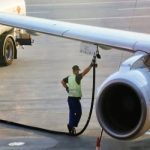Festus Keyamo, Minister of Aviation, has offered sympathies to the families of those involved in the plane tragedy that occurred in Port Harcourt on Thursday.
He assured the public that the government will thoroughly investigate what led to the crash.
The Plane crash claimed the lives of three people, confirmed to be employees of the Nigerian National Petroleum Corporation limited.
The Nigerian National Petroleum Corporation limited in a statement had confirmed that the victims were among its staff members.
Despite ongoing attempts to tighten regulatory supervision and modernise the sector, the disaster has renewed concerns about the safety of the country’s skies.

This incident adds to the country’s bleak history of aviation mishaps in the last decade.
One of the deadliest incidents was the Dana Air crash in 2012, which killed 153 people when the plane went down in Lagos.
In 2013, a plane operated by Associated Airlines crashed shortly after takeoff, resulting in 16 fatalities.
Helicopter crashes have also marred Nigeria’s aviation landscape.
In 2015, a Bristow helicopter plunged into the Lagos lagoon, killing six people.
More recently, in 2021, a military aircraft carrying Nigeria’s Chief of Army Staff, Lieutenant General Ibrahim Attahiru, crashed in Kaduna claiming his life and that of 10 other officers.
The Aviation Minister, Festus Keyamo, in a statement addressing the Port Harcourt crash, extended condolences to the families of the victims and assured the public of the government’s swift response and investigation into the cause of the crash.
A key player in this investigation will be the Nigerian Safety Investigation Bureau.
The NSIB is responsible for conducting thorough and impartial investigations into aviation accidents in Nigeria.
Meanwhile, NNPC Limited expressed deep sorrow over the loss of its staff.
The organisation pledged to support the ongoing search and rescue operation.
With at least seven major plane crashes in the last 10 years, Nigeria’s aviation sector remains under scrutiny.
The call to the government and regulators has grown even louder on the need to address persistent gaps in the system and ensure air travel is safe and reliable for all passengers.
Festus Keyamo, Minister of Aviation, has offered sympathies to the families of those involved in the plane tragedy that occurred in Port Harcourt on Thursday.
He assured the public that the government will thoroughly investigate what led to the crash.
The Plane crash claimed the lives of three people, confirmed to be employees of the Nigerian National Petroleum Corporation limited.
The Nigerian National Petroleum Corporation limited in a statement had confirmed that the victims were among its staff members.
Despite ongoing attempts to tighten regulatory supervision and modernise the sector, the disaster has renewed concerns about the safety of the country’s skies.

This incident adds to the country’s bleak history of aviation mishaps in the last decade.
One of the deadliest incidents was the Dana Air crash in 2012, which killed 153 people when the plane went down in Lagos.
In 2013, a plane operated by Associated Airlines crashed shortly after takeoff, resulting in 16 fatalities.
Helicopter crashes have also marred Nigeria’s aviation landscape.
In 2015, a Bristow helicopter plunged into the Lagos lagoon, killing six people.
More recently, in 2021, a military aircraft carrying Nigeria’s Chief of Army Staff, Lieutenant General Ibrahim Attahiru, crashed in Kaduna claiming his life and that of 10 other officers.
The Aviation Minister, Festus Keyamo, in a statement addressing the Port Harcourt crash, extended condolences to the families of the victims and assured the public of the government’s swift response and investigation into the cause of the crash.
A key player in this investigation will be the Nigerian Safety Investigation Bureau.
The NSIB is responsible for conducting thorough and impartial investigations into aviation accidents in Nigeria.
Meanwhile, NNPC Limited expressed deep sorrow over the loss of its staff.
The organisation pledged to support the ongoing search and rescue operation.
With at least seven major plane crashes in the last 10 years, Nigeria’s aviation sector remains under scrutiny.
The call to the government and regulators has grown even louder on the need to address persistent gaps in the system and ensure air travel is safe and reliable for all passengers.
Festus Keyamo, Minister of Aviation, has offered sympathies to the families of those involved in the plane tragedy that occurred in Port Harcourt on Thursday.
He assured the public that the government will thoroughly investigate what led to the crash.
The Plane crash claimed the lives of three people, confirmed to be employees of the Nigerian National Petroleum Corporation limited.
The Nigerian National Petroleum Corporation limited in a statement had confirmed that the victims were among its staff members.
Despite ongoing attempts to tighten regulatory supervision and modernise the sector, the disaster has renewed concerns about the safety of the country’s skies.

This incident adds to the country’s bleak history of aviation mishaps in the last decade.
One of the deadliest incidents was the Dana Air crash in 2012, which killed 153 people when the plane went down in Lagos.
In 2013, a plane operated by Associated Airlines crashed shortly after takeoff, resulting in 16 fatalities.
Helicopter crashes have also marred Nigeria’s aviation landscape.
In 2015, a Bristow helicopter plunged into the Lagos lagoon, killing six people.
More recently, in 2021, a military aircraft carrying Nigeria’s Chief of Army Staff, Lieutenant General Ibrahim Attahiru, crashed in Kaduna claiming his life and that of 10 other officers.
The Aviation Minister, Festus Keyamo, in a statement addressing the Port Harcourt crash, extended condolences to the families of the victims and assured the public of the government’s swift response and investigation into the cause of the crash.
A key player in this investigation will be the Nigerian Safety Investigation Bureau.
The NSIB is responsible for conducting thorough and impartial investigations into aviation accidents in Nigeria.
Meanwhile, NNPC Limited expressed deep sorrow over the loss of its staff.
The organisation pledged to support the ongoing search and rescue operation.
With at least seven major plane crashes in the last 10 years, Nigeria’s aviation sector remains under scrutiny.
The call to the government and regulators has grown even louder on the need to address persistent gaps in the system and ensure air travel is safe and reliable for all passengers.
Festus Keyamo, Minister of Aviation, has offered sympathies to the families of those involved in the plane tragedy that occurred in Port Harcourt on Thursday.
He assured the public that the government will thoroughly investigate what led to the crash.
The Plane crash claimed the lives of three people, confirmed to be employees of the Nigerian National Petroleum Corporation limited.
The Nigerian National Petroleum Corporation limited in a statement had confirmed that the victims were among its staff members.
Despite ongoing attempts to tighten regulatory supervision and modernise the sector, the disaster has renewed concerns about the safety of the country’s skies.

This incident adds to the country’s bleak history of aviation mishaps in the last decade.
One of the deadliest incidents was the Dana Air crash in 2012, which killed 153 people when the plane went down in Lagos.
In 2013, a plane operated by Associated Airlines crashed shortly after takeoff, resulting in 16 fatalities.
Helicopter crashes have also marred Nigeria’s aviation landscape.
In 2015, a Bristow helicopter plunged into the Lagos lagoon, killing six people.
More recently, in 2021, a military aircraft carrying Nigeria’s Chief of Army Staff, Lieutenant General Ibrahim Attahiru, crashed in Kaduna claiming his life and that of 10 other officers.
The Aviation Minister, Festus Keyamo, in a statement addressing the Port Harcourt crash, extended condolences to the families of the victims and assured the public of the government’s swift response and investigation into the cause of the crash.
A key player in this investigation will be the Nigerian Safety Investigation Bureau.
The NSIB is responsible for conducting thorough and impartial investigations into aviation accidents in Nigeria.
Meanwhile, NNPC Limited expressed deep sorrow over the loss of its staff.
The organisation pledged to support the ongoing search and rescue operation.
With at least seven major plane crashes in the last 10 years, Nigeria’s aviation sector remains under scrutiny.
The call to the government and regulators has grown even louder on the need to address persistent gaps in the system and ensure air travel is safe and reliable for all passengers.
Festus Keyamo, Minister of Aviation, has offered sympathies to the families of those involved in the plane tragedy that occurred in Port Harcourt on Thursday.
He assured the public that the government will thoroughly investigate what led to the crash.
The Plane crash claimed the lives of three people, confirmed to be employees of the Nigerian National Petroleum Corporation limited.
The Nigerian National Petroleum Corporation limited in a statement had confirmed that the victims were among its staff members.
Despite ongoing attempts to tighten regulatory supervision and modernise the sector, the disaster has renewed concerns about the safety of the country’s skies.

This incident adds to the country’s bleak history of aviation mishaps in the last decade.
One of the deadliest incidents was the Dana Air crash in 2012, which killed 153 people when the plane went down in Lagos.
In 2013, a plane operated by Associated Airlines crashed shortly after takeoff, resulting in 16 fatalities.
Helicopter crashes have also marred Nigeria’s aviation landscape.
In 2015, a Bristow helicopter plunged into the Lagos lagoon, killing six people.
More recently, in 2021, a military aircraft carrying Nigeria’s Chief of Army Staff, Lieutenant General Ibrahim Attahiru, crashed in Kaduna claiming his life and that of 10 other officers.
The Aviation Minister, Festus Keyamo, in a statement addressing the Port Harcourt crash, extended condolences to the families of the victims and assured the public of the government’s swift response and investigation into the cause of the crash.
A key player in this investigation will be the Nigerian Safety Investigation Bureau.
The NSIB is responsible for conducting thorough and impartial investigations into aviation accidents in Nigeria.
Meanwhile, NNPC Limited expressed deep sorrow over the loss of its staff.
The organisation pledged to support the ongoing search and rescue operation.
With at least seven major plane crashes in the last 10 years, Nigeria’s aviation sector remains under scrutiny.
The call to the government and regulators has grown even louder on the need to address persistent gaps in the system and ensure air travel is safe and reliable for all passengers.
Festus Keyamo, Minister of Aviation, has offered sympathies to the families of those involved in the plane tragedy that occurred in Port Harcourt on Thursday.
He assured the public that the government will thoroughly investigate what led to the crash.
The Plane crash claimed the lives of three people, confirmed to be employees of the Nigerian National Petroleum Corporation limited.
The Nigerian National Petroleum Corporation limited in a statement had confirmed that the victims were among its staff members.
Despite ongoing attempts to tighten regulatory supervision and modernise the sector, the disaster has renewed concerns about the safety of the country’s skies.

This incident adds to the country’s bleak history of aviation mishaps in the last decade.
One of the deadliest incidents was the Dana Air crash in 2012, which killed 153 people when the plane went down in Lagos.
In 2013, a plane operated by Associated Airlines crashed shortly after takeoff, resulting in 16 fatalities.
Helicopter crashes have also marred Nigeria’s aviation landscape.
In 2015, a Bristow helicopter plunged into the Lagos lagoon, killing six people.
More recently, in 2021, a military aircraft carrying Nigeria’s Chief of Army Staff, Lieutenant General Ibrahim Attahiru, crashed in Kaduna claiming his life and that of 10 other officers.
The Aviation Minister, Festus Keyamo, in a statement addressing the Port Harcourt crash, extended condolences to the families of the victims and assured the public of the government’s swift response and investigation into the cause of the crash.
A key player in this investigation will be the Nigerian Safety Investigation Bureau.
The NSIB is responsible for conducting thorough and impartial investigations into aviation accidents in Nigeria.
Meanwhile, NNPC Limited expressed deep sorrow over the loss of its staff.
The organisation pledged to support the ongoing search and rescue operation.
With at least seven major plane crashes in the last 10 years, Nigeria’s aviation sector remains under scrutiny.
The call to the government and regulators has grown even louder on the need to address persistent gaps in the system and ensure air travel is safe and reliable for all passengers.
Festus Keyamo, Minister of Aviation, has offered sympathies to the families of those involved in the plane tragedy that occurred in Port Harcourt on Thursday.
He assured the public that the government will thoroughly investigate what led to the crash.
The Plane crash claimed the lives of three people, confirmed to be employees of the Nigerian National Petroleum Corporation limited.
The Nigerian National Petroleum Corporation limited in a statement had confirmed that the victims were among its staff members.
Despite ongoing attempts to tighten regulatory supervision and modernise the sector, the disaster has renewed concerns about the safety of the country’s skies.

This incident adds to the country’s bleak history of aviation mishaps in the last decade.
One of the deadliest incidents was the Dana Air crash in 2012, which killed 153 people when the plane went down in Lagos.
In 2013, a plane operated by Associated Airlines crashed shortly after takeoff, resulting in 16 fatalities.
Helicopter crashes have also marred Nigeria’s aviation landscape.
In 2015, a Bristow helicopter plunged into the Lagos lagoon, killing six people.
More recently, in 2021, a military aircraft carrying Nigeria’s Chief of Army Staff, Lieutenant General Ibrahim Attahiru, crashed in Kaduna claiming his life and that of 10 other officers.
The Aviation Minister, Festus Keyamo, in a statement addressing the Port Harcourt crash, extended condolences to the families of the victims and assured the public of the government’s swift response and investigation into the cause of the crash.
A key player in this investigation will be the Nigerian Safety Investigation Bureau.
The NSIB is responsible for conducting thorough and impartial investigations into aviation accidents in Nigeria.
Meanwhile, NNPC Limited expressed deep sorrow over the loss of its staff.
The organisation pledged to support the ongoing search and rescue operation.
With at least seven major plane crashes in the last 10 years, Nigeria’s aviation sector remains under scrutiny.
The call to the government and regulators has grown even louder on the need to address persistent gaps in the system and ensure air travel is safe and reliable for all passengers.
Festus Keyamo, Minister of Aviation, has offered sympathies to the families of those involved in the plane tragedy that occurred in Port Harcourt on Thursday.
He assured the public that the government will thoroughly investigate what led to the crash.
The Plane crash claimed the lives of three people, confirmed to be employees of the Nigerian National Petroleum Corporation limited.
The Nigerian National Petroleum Corporation limited in a statement had confirmed that the victims were among its staff members.
Despite ongoing attempts to tighten regulatory supervision and modernise the sector, the disaster has renewed concerns about the safety of the country’s skies.

This incident adds to the country’s bleak history of aviation mishaps in the last decade.
One of the deadliest incidents was the Dana Air crash in 2012, which killed 153 people when the plane went down in Lagos.
In 2013, a plane operated by Associated Airlines crashed shortly after takeoff, resulting in 16 fatalities.
Helicopter crashes have also marred Nigeria’s aviation landscape.
In 2015, a Bristow helicopter plunged into the Lagos lagoon, killing six people.
More recently, in 2021, a military aircraft carrying Nigeria’s Chief of Army Staff, Lieutenant General Ibrahim Attahiru, crashed in Kaduna claiming his life and that of 10 other officers.
The Aviation Minister, Festus Keyamo, in a statement addressing the Port Harcourt crash, extended condolences to the families of the victims and assured the public of the government’s swift response and investigation into the cause of the crash.
A key player in this investigation will be the Nigerian Safety Investigation Bureau.
The NSIB is responsible for conducting thorough and impartial investigations into aviation accidents in Nigeria.
Meanwhile, NNPC Limited expressed deep sorrow over the loss of its staff.
The organisation pledged to support the ongoing search and rescue operation.
With at least seven major plane crashes in the last 10 years, Nigeria’s aviation sector remains under scrutiny.
The call to the government and regulators has grown even louder on the need to address persistent gaps in the system and ensure air travel is safe and reliable for all passengers.














